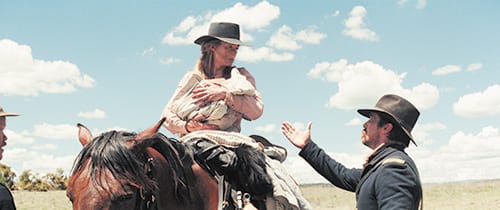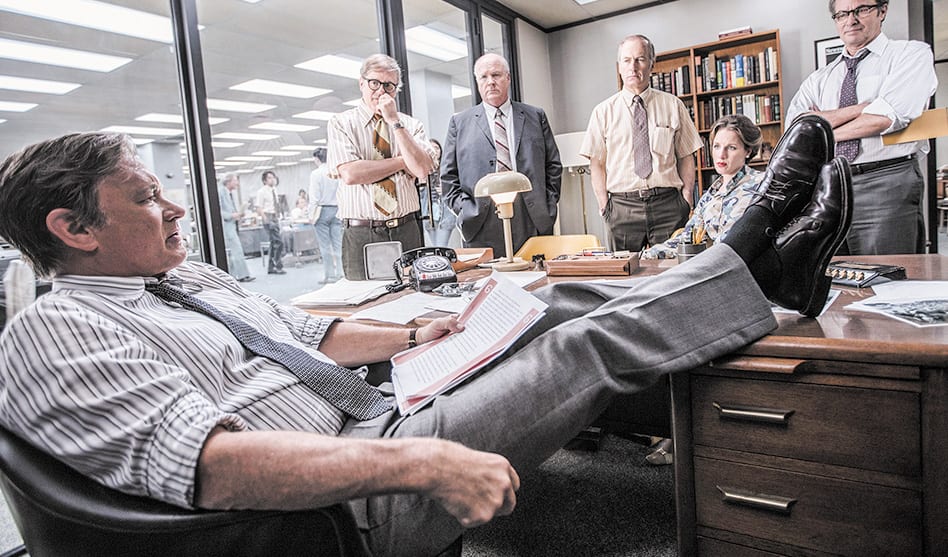Ben Bradlee (Tom Hanks, seated) considers a story that could rock the White House in ‘The Post.’
Spielberg takes on the White House in ‘The Post;’ Cooper goes native in ‘Hostiles’
ARNOLD WAYNE JONES | Executive Editor
jones@dallasvoice.com
The Post. Full disclosure: It’s difficult to be immersed in the field of journalism and not react almost instinctually to a movie like The Post, which painstakingly, soberly but generously portrays the occupation of newsgathering not merely as a job, but a mission fraught with ethical ambiguity, personal sacrifice and hard-to-admit logrolling of competing forces: What do you report, and when? Are your sources scamming you or deceived themselves? Will what you say have unexpected consequences that could lay a heavy moral burden on you, but is the truth still worth it?
These are issues that plague all journalists… or did, until the Breitbarts and FoxNewses and AlternativeFacts purveyors turned the respected field of reportage into a hashtag for “fake news” and bullying demagoguery. To some of us, the job still matters, even though it’s much, much harder to do nowadays.
But The Post, the holiday prestige picture consequentially and magnificently presented by director Steven Spielberg, shows how these concerns lurked over one of the preeminent media companies of the last 50 years, no matter what our current Commander-in-Cheeto tweets. In the late 1960s, the Washington Post was little more than a local paper whose city just happened to be the seat of federal government. But the Graham family that owned it wanted to expand its reach, hiring a promising editor name Ben Bradlee (Tom Hanks) to compete on a national level with the likes of the Old Gray Lady, the austere New York Times.
When Phil Graham committed suicide, ownership of the Post passed to his widow, Kay (Meryl Streep), a savvy socialite still trapped in an era where women were expected to stay in the bedroom and out of the boardroom. Kay, though, needed to assert her authority during a tumultuous week in the summer of 1971, when, in an effort to raise capital, the Post planned an initial public offering just as a story crossed its desk: the release of documents that came to be known as The Pentagon Papers, an exhaustive series of memos written over decades that, in short, revealed that the Vietnam War was unwinnable for the U.S., and higher-ups in government knew it all along. It was political dynamite, at a time when lying to the American people still meant something and Executive Branch abuse of authority caused consternation in the voting booth. The New York Times broke the story, and was under attack from the White House to silence the reporting; the Post obtained the same information, though, so Bradlee (as the editor invested in uncovering news) and Kay (as the ultimate arbiter of what her publication could endure legally and financially) were saddled with deciding what to do: Stand up for the First Amendment, or risk imprisonment and possible ruin.
As with Apollo 13, The Post can’t make a secret out of what they decided; it can only tell the inside story and provide the emotional impact of being in the room when it was happening.
Like Spotlight a few years back and movies like All the President’s Men from a generation ago, The Post has the studied, dour authority of folks handling the journalistic equivalent of nitroglycerin, fully aware that their choices will resonate beyond the pages of the morning’s broadsheet. Spielberg invests the film with thriller-like tension set within the walls of power, not the battlefield. Xerox machines become conspirators; running to the corner newsstand at dawn to smack down quarters and read the first edition has the texture of an era passing us by. (I’m old enough to remember routinely washing newsprint from my hands; I bet a lot of you reading this have no idea what that even means.)
Streep and Hanks, uniting for the first time in a movie, are perfectly cast (Streep is a magician who has moved from the pinched naïf of her earliest films to the patrician grande dame of acting without missing a beat), but Spielberg’s brilliance can also be seen in the casting of actors often associated with comedy (David Cross, Bob Odenkirk) in straight roles that they handle excellently. He takes you into the newsroom and the halls of Washington where the real decisions are made and poses the conundrum: What would you do? It’s not as easy to answer as you might think.
But while The Post is the most engaging and hopeful movie of the year, it is also one of the saddest. It’s difficult not to watch as these serious people debate serious matters and not wonder if the torch has passed to SEO, click-bait, native advertising, advertorial and partisan shouting. We know good journalism is still happening; The Post makes you realize, though, that there was a time when citizens really cared about journalism.

A cavalry captain (Christian Bale) escorts a widow (Rosamund Pike) across dangerous territory in ‘Hostiles’.
Hostiles. Scott Cooper is a master at making competent, sincere, solidly good films that just don’t wow you. His first big success, Crazy Heart, won Jeff Bridges an overdue Oscar, but its story of a washed-up country music star getting his life back together felt clichéd, familiar, safe. Cooper moved on to a different genre (crime drama) with Out of the Furnace and Black Mass, and, having exhausted those tropes, now tackles yet another genre — the Western.
Hostiles is fiction that plays as if it could be fact. In 1892, a serious army captain named Blocker (Christian Bale, yet again disappearing into a role) with a distaste for the Indians he has fought against is inexplicably assigned to escort a captured Cheyenne chief (Wes Studi) from Colorado to his ancestral lands in Wyoming. (It’s a road movie with horses and arrows!) Of course, Blocker hates the chief and all his people; of course, by the end they are allies, even friends, and Blocker sees the peaceful nature of the Cheyenne, as well as the antagonism of the white men invading their territory. (“I have seen the enemy, and he is us” might well have been typed on every page of the script in invisible ink.) Cooper isn’t all that subtle in showing the brutality of the Comanche… and the equal sadism of the cavalry — each side would call the other “a hostile” … and both sides would be correct.
It’s predictable as Cooper’s movies tend to be, but, as acknowledged, he is a capable director, and Hostiles overflows with beautiful vistas, solid character performances (not just from Bale and Studi, but Rosamund Pike and Rory Cochrane) and visceral gunfights. As expected, it cleaves to the elements of the form, but it does so reliably and effectively.











